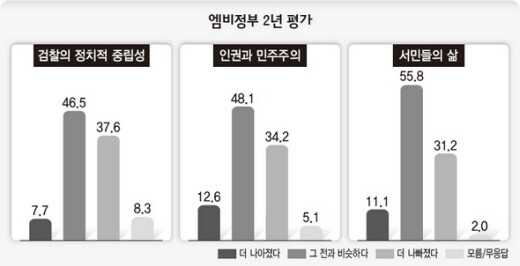hankyoreh
Links to other country sites 다른 나라 사이트 링크
[Analysis] President Lee’s third year hurdles and expected Cabinet shake-up

President Lee Myung-bak has begun the third year of his administration. The Cheong Wa Dae (the presidential office in South Korea or Blue House) announced said Sunday that President Lee will focus his New Year’s address on Monday on his goals for this year relating to turning South Korea into a leading developed nation that draws from advanced reforms in all sectors of society. Political analysts say President Lee, who has expressed his will that there be no lame duck period in his administration, has some high hills to cross within the first half of the year to make his third year a fruitful one.
The first hill is Sejong City. The administration plans to put forth its alternative plan for Sejong City on Dec 11, 2010. Its plan would nullify earlier plans to develop a second administrative or second capital in the newly-developed Sejong City, and transform it into an economic hub based on education and science. Analysts are saying Lee’s ability to manage national affairs could take off or crash depending on whether the plan passes through the National Assembly. It is the biggest task that will determine the fate of his administration this year. The Lee administration intends to begin a full-scale effort to sell the alternative plan after presenting it in December. Some anticipate visits by President Lee to the Chungcheong region that includes a public debate and press conference, as well as a meeting with opposition leaders. A key official with the Cheong Wa Dae’s Political Affairs Office says although it would be best to pass the Sejong City bill during the National Assembly’s temporary session scheduled for February, it could be moved to the temporary session scheduled for April if more time is needed to persuade residents in the Chungcheong region, and elements within the ruling party and opposition lawmakers.
The second hill is the impending shakeup of the Cabinet and Cheong Wa Dae staff. There are a good many ministers, vice ministers and Cheong Wa Dae advisors that have been around for the Lee administration’s first two years, and changes in the Cabinet and the Cheong Wa Dae are being seen as necessary to reform the mood associated with the national administration. In addition, some current leading government officials are expected to run in the June 2 regional elections and their resignation will leave openings in both the Cabinet and the Cheong Wa Dae. Many anticipate Cabinet changes in late February or early March due to both the upcoming Feb. 25 anniversary of the administration and the upcoming March 4 deadline for officials to resign in order to run in local elections. A key ruling party figure says it is highly likely a shakeup will begin starting Feb. 25. The official said due to the possibility of a party convention in March, changes could be coming in the Cabinet, party leadership and the Cheong Wa Dae.
The third hill is the June regional elections. Media opinion polls show President Lee’s support ratings are at over 50 percent. Regional elections, however, have tended to produce restraints on the administration with voters meting out crushing ruling party defeats and party discord that turn presidents into lame ducks. Whether Lee can escape this precedent will be one of the most significant issues facing his administration this year. A Cheong Wa Dae official said the nationwide local elections are particularly significant as they take place precisely at the midpoint of Lee’s presidential term. Analysts say Lee’s political reform agenda that includes administrative district reform, electoral district reform and constitutional reform will be influenced by the results of the regional elections. Another key Cheong Wa Dae official also added that even if Lee pushes for an inter-Korean summit, such a move would likely come after the regional elections in order to avoid any negative political effects.
Please direct questions or comments to [englishhani@hani.co.kr]
Editorial・opinion
![[Column] Season 2 of special prosecutor probe may be coming to Korea soon [Column] Season 2 of special prosecutor probe may be coming to Korea soon](https://flexible.img.hani.co.kr/flexible/normal/500/300/imgdb/original/2024/0426/3317141030699447.jpg) [Column] Season 2 of special prosecutor probe may be coming to Korea soon
[Column] Season 2 of special prosecutor probe may be coming to Korea soon![[Column] Park Geun-hye déjà vu in Yoon Suk-yeol [Column] Park Geun-hye déjà vu in Yoon Suk-yeol](https://flexible.img.hani.co.kr/flexible/normal/500/300/imgdb/original/2024/0424/651713945113788.jpg) [Column] Park Geun-hye déjà vu in Yoon Suk-yeol
[Column] Park Geun-hye déjà vu in Yoon Suk-yeol- [Editorial] New weight of N. Korea’s nuclear threats makes dialogue all the more urgent
- [Guest essay] The real reason Korea’s new right wants to dub Rhee a founding father
- [Column] ‘Choson’: Is it time we start referring to N. Korea in its own terms?
- [Editorial] Japan’s rewriting of history with Korea has gone too far
- [Column] The president’s questionable capacity for dialogue
- [Column] Are chaebol firms just pizza pies for families to divvy up as they please?
- [Column] Has Korea, too, crossed the Rubicon on China?
- [Correspondent’s column] In Japan’s alliance with US, echoes of its past alliances with UK
Most viewed articles
- 1‘We must say no’: Seoul defense chief on Korean, USFK involvement in hypothetical Taiwan crisis
- 2[Column] Season 2 of special prosecutor probe may be coming to Korea soon
- 3N. Korean delegation’s trip to Iran shows how Pyongyang is leveraging ties with Moscow
- 4Amnesty notes ‘erosion’ of freedom of expression in Korea in annual human rights report
- 5Korea sees more deaths than births for 52nd consecutive month in February
- 6[Reportage] On US campuses, student risk arrest as they call for divestment from Israel
- 7[Editorial] New weight of N. Korea’s nuclear threats makes dialogue all the more urgent
- 8‘Weddingflation’ breaks the bank for Korean couples-to-be
- 9Division commander ordered troops to enter raging flood waters before Marine died, survivor says
- 10[Editorial] Korea’s surprise Q1 growth requires objective assessment, not blind fanfare